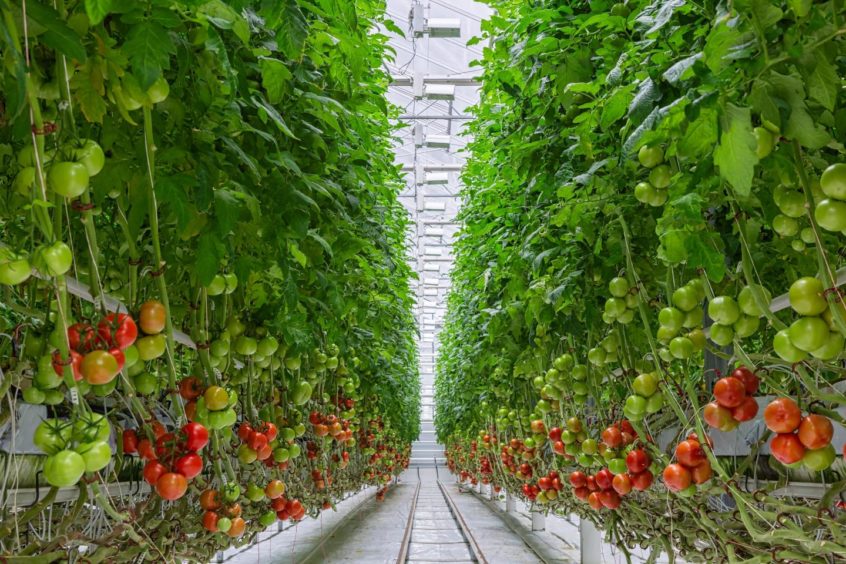
I like to think that by now nobody in Scotland with an IQ greater than 1 hasn’t realised that climate change is a real and present danger. The IPCC “Code Red” report, record temperatures, destructive floods and the very disturbing news that the Gulf Stream is showing signs of slowing down is surely enough to convince even the most stubborn that we really do need to phase out the burning of fossil fuels and make other quite dramatic changes to how we live and work.
Putting aside for a minute the big hits of heat, transport and industrial applications there remains a need for technology development across a range of other activities.
What makes some of these activities deserving of attention is a combination of issues which can include not just climate change but other negative influences such as Brexit, which exacerbate the problem of climate change. Take food supply chains and particularly the supply of fresh vegetables and fruit.
Many countries have huge glasshouses growing produce. An Irish farmer recently told me one of his concerns was how to make the switch from diesel which provided the heat for his glasshouses. The issue wasn’t heat but the fact that he used filtered exhaust gas to elevate the CO2 level to improve growth rates. So, his concern was where he could get the additional CO2 from. Crack this problem and we can dramatically reduce the number of “carbon miles” created by importing from abroad and add more resilience to our supply chains.
I recently came across a Swedish company that has developed a scalable biogas reformer. It uses biogas to produce hydrogen but because it’s produced from vegetable matter or animal “manure” releasing the CO2 produced back into the atmosphere makes it a carbon neutral process. However, if such a system could be used in conjunction with a glasshouse complex the hydrogen could provide the heat and the CO2 could be fed to the plants. Problem solved by a firm in a country that doesn’t have much oil and gas.
We also know that Scotland relies heavily on ferries which use hydrocarbon fuels. Norway has just delivered its first hydrogen-fuel ferry, Sweden has at least two hydrogen fuel ferry projects on the go and the US is about to deliver its first one. Scotland is involved in an EU funded ferry project but I don’t believe the yard has started cutting metal yet. This could become a big industry.
It’s likely that people are going to be spending more time working from home. Those homes will need bigger gardens with space for growing more of our own vegetables and that means more composting rather than using peat. Perhaps there will be a community glasshouse heated by hydrogen produced by reforming the biomethane produced by a communal septic tank.
Bigger houses and gardens imply more land use and land is now ridiculously expensive. How will the government deal with that?
Even producing salmon can be done in a much more energy efficient and environmentally acceptable way by doing it on land rather than at sea. No more lice and you can use solar, wind or hydro power to run the plant. Makes sense, doesn’t it? Look up “pure salmon”. It’s an eye opener.
I’ve listed just a very few of the issues we need to tackle on top of the big stuff but, believe me, they all matter and they’ll all have an impact on climate change. But I’m afraid I have to tell you that we are no closer to dealing with these.
If Scotland is serious about transitioning away from burning fossil fuels and stopping new developments such as the Cambo field then we need the means to do it. It’s nothing to do with avoiding imports of hydrocarbons because we do that already and of course we also export a lot. No, it’s simply a matter of having the ability to displace oil and gas and replace it with something else whilst maintaining as many skilled, high value job as possible.
That doesn’t just mean services, but also manufacturing, and there is almost no sign of that happening. Whilst that remains the case the calls to “Stop Cambo” are futile.
It’s similar in many respects to the “everyone should use public transport” argument. The problem is how to do that when we have nothing like enough buses, not enough routes and keep having to import them anyway.
Cambo is a distraction from the real issue which is the lack of any detectable industrial strategy on everything from hydrogen electrolysers to “passiv-haus” standard dwellings.
It would be nice to see some reality creep back in before we fall even further behind our peers and competitors because, frankly, it’s all getting a bit tedious now.
Dick Winchester is a member of the Scottish Government’s oil and gas and energy transition strategic leadership group
Recommended for you
